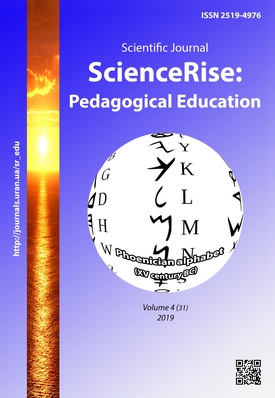Критерії та рівні сформованості професійних компетентностей у фахівців природоохоронної галузі з екологічного моніторингу
DOI:
https://doi.org/10.15587/2519-4984.2019.174106Ключові слова:
екологічний моніторинг, післядипломна освіта, критерії, рівні, професійні компетентності, професійний розвитокАнотація
Під час дослідження розроблено критерії та рівні оцінки ступеневої системи підготовки фахівців природоохоронної галузі до екологічного моніторингу: для майбутніх фахівців та професіоналів за рівнем сформованості професійних компетентностей з екологічного моніторингу; для фахівців природоохоронної галузі за рівнем готовності до професійної діяльності. Побудована критеріально-рівнева шкала для оцінки сформованості професійних компетентностей майбутніх фахівців включає в себе мотиваційний, теоретико-методологічний та аналітико-практичний критерії. Оцінювання здійснюється за репродуктивним, достатнім та високим рівнями. Для майбутніх професіоналів з екологічного моніторингу критеріально-рівнева шкала для оцінки сформованості професійних компетентностей включає в себе мотиваційно-ціннісний, діяльнісно-практичний, науково-дослідницький критерії та інтерпретуючий, конструктивний, дослідницький рівні. Для професійного розвитку фахівців природоохоронної галузі у системі післядипломної освіти критеріально-рівнева шкала розроблена для оцінки рівня готовності до професійної діяльності, яка включає в себе наступні критерії: мотиваційно-аксіологічний для оцінки сформованості мотивів професійної природоохоронної діяльності; компетентністний для оцінки професійності; професійне ставлення для оцінки особистого відношення до професійної діяльності, зокрема самостійність у прийнятті рішень, у використанні різних підходів до вирішення складних екологічних ситуацій, у розробці і плануванні проектів щодо покращення якості довкілля. Відповідно до особливостей професійного розвитку здійснено визначення рівнів готовності, а саме базисний, інтегративно-проектний, творчо-креативний. Розроблені та обґрунтовані критерії, показники та рівні забезпечують здійснення оцінки ступеневої системи підготовки фахівців природоохоронної галузі до екологічного моніторингу через сформованість професійних компетентностей і готовність до професійної діяльності
Посилання
- Borodiienko, O. (2017). Kryterii, pokaznyky, rivni sformovanosti profesiinoi kompetentnosti kerivnykiv strukturnykh pidrozdiliv pidpryiemstv sfery zviazku. Molod i rynok, 7 (150), 109–115.
- Semenova, A. V. (Ed.) (2006). Slovnyk-dovidnyk z profesiinoi pedahohiky. Odessa: Palmira, 364.
- Huba, A. V. (2016). Stratehiia formuvannia profesiinoi kompetentnosti menedzhera turystychnoi industrii. Kharkiv: KhNPU, 260.
- Vizniuk, V. V. (2016). Kryterii ta rivni sformovanosti profesiinoi nadiinosti maibutnikh kerivnykiv navchalnykh zakladiv v umovakh mahistratury. Naukovyi chasopys NPU imeni M. P. Dahomanova. Seriia 5. Pedahohichni nauky: realii ta perspektyvy, 55, 52–57.
- Onyshchuk, S. O. (2018). Kryterii, pokaznyky ta rivni sformovanosti zdoroviazberezhuvalnoi kompetentnosti v maibutnikh fakhivtsiv. Naukovyi chasopys NPU imeni M. P. Drahomanova, 3K (97), 387–390.
- Biletska, H. A. (2014). Criteria, Indicators, and Levels of Natural Science Competence of Prospective Ecologists. Education and Pedagogical Sciences, (2 (163)), 19–24. http://doi.org/10.12958/eps.2(163).biletska_h_a
- Huzii, N. V. (2015). Kreatyvno-aksiolohichna spriamovanist dydaskalohichnoho osvitnoho prostoru stanovlennia pedahohichnoho profesionalizmu naukovo-pedahohichnykh kadriv. Teoriia i praktyka pidhotovky naukovo-pedahohichnykh kadriv v Ukraini. Kyiv: SPD-FO Rudyk V. A., 223–233.
- Vincent, S., Focht, W. (2010). Environmental Reviews and Case Studies: In Search of Common Ground: Exploring Identity and Core Competencies for Interdisciplinary Environmental Programs. Environmental Practice, 12 (1), 76–86. doi: http://doi.org/10.1017/s1466046609990433
- Ramsarup, P., Lotz-Sisitka, H. (2017). The nature of learning and work transitioning in boundaryless work: the case of the environmental engineer. Southern African Journal of Environmental Education, 33 (1), 99–116. doi: http://doi.org/10.4314/sajee.v.33i1.8
- Ponomarenko, Y., Yessaliev, A., Kenzhebekovac, R., Moldabekc, K., Larchekovad, L., Dairbekove, S. et. al. (2016). Students’ Environmental Competence Formation as a Pedagogical Problem. International Journal Of Environmental & Science Education, 11 (18), 11735–11750.
##submission.downloads##
Опубліковано
Як цитувати
Номер
Розділ
Ліцензія
Авторське право (c) 2019 Natalia Bordiug

Ця робота ліцензується відповідно до Creative Commons Attribution 4.0 International License.
Наше видання використовує положення про авторські права Creative Commons CC BY для журналів відкритого доступу.
Автори, які публікуються у цьому журналі, погоджуються з наступними умовами:
1. Автори залишають за собою право на авторство своєї роботи та передають журналу право першої публікації цієї роботи на умовах ліцензії Creative Commons CC BY, котра дозволяє іншим особам вільно розповсюджувати опубліковану роботу з обов'язковим посиланням на авторів оригінальної роботи та першу публікацію роботи у цьому журналі.
2. Автори мають право укладати самостійні додаткові угоди щодо неексклюзивного розповсюдження роботи у тому вигляді, в якому вона була опублікована цим журналом (наприклад, розміщувати роботу в електронному сховищі установи або публікувати у складі монографії), за умови збереження посилання на першу публікацію роботи у цьому журналі.









